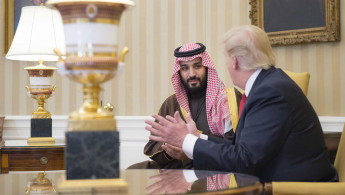Trump hails 'great friendship' with Saudi's bin Salman
"It is an honour to have the crown prince of Saudi Arabia with us," Trump said with bin Salman across the table from him. "The relationship is probably the strongest it's ever been - we understand each other."
"We really have a great friendship, a great relationship," he added.
On the eve of the White House talks, Adel al-Jubier, the Saudi Foreign Minister, and former ambassador to Washington, described relations with the US as "at an all-time high".
Reports carried out by the Guardian suggest that regional advisors however, have advised Saudi Crown Prince Mohammed bin Salman to set a distance between himself and the 'volatile' American president.
Trump received the crown prince at the White House, the start of a three-week seven-city trip for bin Salman around the US.
After a week of meetings in Washington, the crown prince will head to New York, the financial centre of the country, on Saturday.
Prince Mohammed is expected to discuss the partial sale of Saudi Aramco, the kingdom's oil giant, valued at around $100 billion makes it the world's largest-ever share offering.
After Washington, the Crown Prince is expected to fly to Boston, New York, Seattle, San Francisco, Los Angeles and Houston.
A series of social reforms have been introduced as part of a programme dubbed ''Vision 2030" looking to modernise the country. This has coincided with a crackdown on opposition and a disastrous war in Yemen.
Yemen involvement
The ambitious prince is set to meet the UN Secretary General Antonio Gueterres in New York, who has criticised the Saudi conduct in the war against Yemen.
Saudi Arabia's war in Yemen has killed or injured 5,000 children with around 400,000 more seriously malnourished. More than 9,200 people have been killed in the Yemen war since 2015, when the Saudi-led coalition joined the government's fight against the Houthi rebels.
Yemen is witnessing one of the world's worst outbreaks of cholera, with nearly one million people infected. More than eight million people are at risk of famine as port blockades, cholera and diphtheria bring the Arab world's most impoverished country to its knees.
Previously, President Trump had called for Saudi Arabia to lift its crushing blockade "immediately".
As Saudi Arabia continues to frame all its international conflicts as part of a confrontation with Shia-majority Iran, not much pushback is expected from the White House this visit.
Saudi Arabia defended its "just" war in Yemen ahead of the Crown Prince's visit to London, in the hopes of tempering UK anger over Riyadh's devastating military campaign.
US generals and diplomats are still struggling to calm tensions in the Gulf ten months after Saudi Arabia led its Gulf neighbours in a boycott against former ally Qatar.
In June, Saudi Arabia and the UAE began an air and sea boycott against Qatar, which they accuse of financing terrorism and being overly friendly with Iran.
The US, meanwhile, has continued strategic and trade cooperation with Qatar, including with the approval of $467 million worth of potential foreign military sales to Doha earlier this month.
The Saudi-led boycott of Qatar is thought to have been spearheaded by the kingdom's crown prince, who also announced Riyadh's ambitious "Vision 2030" initiative to build an economy less dependent on oil, while luring more foreign investment.
Jerusalem – a stumbling block
The Prince's arrival hopes to build on the previous relations formed with Trump's son-in-law and unofficial Middle East envoy, Jared Kushner.
Kushner, a regular guest in Riyadh, was keen to present the US' Middle East peace plan that will jump-start negotiations between Israel and Palestinians, despite the Palestinian President Mahmoud Abbas' refusal to accept the US as a mediator.
Palestinians froze ties with the US after Trump broke with decades of American policy in December by recognising Jerusalem as Israel's capital and declaring he would move the country's embassy from Tel Aviv to the contested city.
Palestinian President Mahmoud Abbas said the United States had disqualified itself as a mediator. "We will no longer accept that it has a role in the political process," he said at the time.
Abbas' office said that "Jerusalem is the eternal capital of the state of Palestine, and is not for sale for gold or billions" with other senior officials adding that they will not be "blackmailed" by Trump's threat of aid cuts.
According to reports in the Guardian, the Saudi Prince was responsible for bringing the Palestinians to the table, and Kushner was to do the same with the Israelis. Trump's embassy move, and the Saudi's muted response, proved a stumbling block however.
Trump's 6 December decision to recognise Jerusalem broke with international consensus, triggering protests across the Arab and Muslim world and drawing strong condemnation from its leaders.
Despite Saudi King Salman warning Trump against the controversial move, the domestic response was muted, and Saudi media appeared to be attempting to limit Israeli criticism.
Riyadh has reportedly forbidden peaceful protests in support of the Palestinians or other displays of solidarity.
Sources have claimed that Riyadh has ordered media outlets not to focus "too much attention" on Washington's controversial decision.
Reports said that bin Salman had suggested a Palestinian state on non-contiguous parts of the occupied West Bank with limited sovereignty during a meeting with Abbas in November.
Riyadh also reportedly suggested that Abu Dis, a suburb of East Jerusalem cut off by Israel's separation barrier, could become the Palestinian capital, according to a Lebanese official who spoke to Abbas following his Saudi talks.





 Follow the Middle East's top stories in English at The New Arab on Google News
Follow the Middle East's top stories in English at The New Arab on Google News
![Israeli forces ordered bombed Gaza's Jabalia, ordering residents to leave [Getty]](/sites/default/files/styles/image_330x185/public/2176418030.jpeg?h=a5f2f23a&itok=_YGZaP1z)

